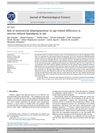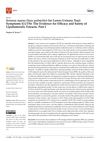8 citations,
October 2019 in “The Journal of surgical research/Journal of surgical research” Sodium valproate helps skin healing by affecting GABA and histone deacetylase.
 December 2023 in “International Journal of Advanced Research in Science, Communication and Technology”
December 2023 in “International Journal of Advanced Research in Science, Communication and Technology” Semecarpus anacardium Linn. is a plant with many health benefits, including reducing inflammation, fighting cancer, and stimulating hair growth.
184 citations,
January 2000 in “European Urology” Blocking the enzyme that turns testosterone into DHT can safely and effectively treat enlarged prostate.
 34 citations,
July 2011 in “International journal of pharmaceutics”
34 citations,
July 2011 in “International journal of pharmaceutics” Ion-paired risedronate significantly increases skin penetration without irritation compared to risedronate alone.
 1 citations,
December 2022 in “BMC Public Health”
1 citations,
December 2022 in “BMC Public Health” Long-term effects of COVID-19 can vary over time and are more likely in certain age and gender groups, while race, income, and education levels have little to no impact. Ongoing medical care is needed due to potential complications.
 January 2019 in “Elsevier eBooks”
January 2019 in “Elsevier eBooks” Different hair disorders have specific treatments and outcomes, with some resolving on their own and others requiring medication or emotional support.
 October 2022 in “Journal of experimental and clinical medicine”
October 2022 in “Journal of experimental and clinical medicine” Repurposing existing drugs for COVID-19 shows promise but requires more research to confirm effectiveness.
 June 2022 in “Rheumatology research”
June 2022 in “Rheumatology research” Lupus can be a rare cause of high calcium levels in the blood.
 February 2022 in “International journal of KIU”
February 2022 in “International journal of KIU” Certain genes and nutrients like vitamin D, zinc, and omega fatty acids affect COVID-19 severity and infection risk.
 4 citations,
November 2018 in “Journal of pharmacological sciences”
4 citations,
November 2018 in “Journal of pharmacological sciences” Mild exercise reduces pain in older rats through a brain chemical, while intense exercise reduces pain in all rats through a different pain-blocking process.
 July 2013 in “Our Dermatology Online”
July 2013 in “Our Dermatology Online” Oral methylprednisolone pulse therapy helped an 11-year-old regrow 80% of his hair in six months.
 January 2024 in “American journal of clinical dermatology”
January 2024 in “American journal of clinical dermatology” Ritlecitinib is safe and well-tolerated for treating alopecia areata in patients aged 12 and older.
 3 citations,
January 2023 in “Dermatology Practical & Conceptual”
3 citations,
January 2023 in “Dermatology Practical & Conceptual” IMA and IMA/albumin levels don't predict alopecia areata severity.
 9 citations,
March 2022 in “Antioxidants”
9 citations,
March 2022 in “Antioxidants” Synthetic antioxidants are effective, cheap, and stable, with some like zinc and cholecalciferol reducing child and cancer deaths, but the safety of additives like BHA, BHT, TBHQ, and PEG needs more research.
 1 citations,
July 2023 in “Frontiers in Immunology”
1 citations,
July 2023 in “Frontiers in Immunology” Oxidative stress and immune dysfunction are linked to both Hashimoto's thyroiditis and polycystic ovary syndrome, with diet and specific treatments important for managing these conditions.
 6 citations,
February 2023 in “Advances in Therapy”
6 citations,
February 2023 in “Advances in Therapy” Baricitinib, a drug for rheumatoid arthritis, atopic dermatitis, and alopecia areata, is generally safe with low risk of major side effects, even in patients with risk factors. It's also effective in promoting hair regrowth in alopecia areata patients.
 66 citations,
March 2018 in “British journal of dermatology/British journal of dermatology, Supplement”
66 citations,
March 2018 in “British journal of dermatology/British journal of dermatology, Supplement” An imbalance between certain immune cells is linked to a chronic skin condition and may be influenced by obesity, smoking, and autoimmune issues.
 1 citations,
December 2017 in “Journal of clinical and investigative dermatology”
1 citations,
December 2017 in “Journal of clinical and investigative dermatology” Platelet-Rich Plasma (PRP) treatment can significantly increase hair count and thickness in people with Androgenetic Alopecia (AGA) with minimal side effects.

Thermal spring waters and their microbes could be good for skin health and treating some skin conditions in skincare products.
 13 citations,
October 2012 in “InTech eBooks”
13 citations,
October 2012 in “InTech eBooks” Nanocarriers could improve how drugs are delivered through the skin but require more research to overcome challenges and ensure safety.
 November 2024 in “International Journal of Research in Medical Sciences”
November 2024 in “International Journal of Research in Medical Sciences” Hypoalbuminemia can cause pleural effusion and needs careful treatment.
 April 2017 in “Journal of Investigative Dermatology”
April 2017 in “Journal of Investigative Dermatology” Fisetin may help treat psoriasis and reduce skin inflammation.
 46 citations,
August 2019 in “Journal of Ethnopharmacology”
46 citations,
August 2019 in “Journal of Ethnopharmacology” Eclipta prostrata has many traditional uses and health benefits, but more research is needed to understand how it works and ensure it's safe.
 3 citations,
January 2017 in “Journal of cosmetology & trichology”
3 citations,
January 2017 in “Journal of cosmetology & trichology” The food supplement with L-cystine, Serenoa repens extract, and biotin safely reduced hair loss and improved hair growth in men and women.
 June 2023 in “Journal of Education, Health and Sport”
June 2023 in “Journal of Education, Health and Sport” CBD is effective for certain epilepsy conditions, shows promise for other health issues, but needs more research for safety and effectiveness.
70 citations,
January 2014 in “International review of cell and molecular biology” Keratin proteins are crucial for healthy skin, but mutations can cause skin disorders with no effective treatments yet.
 33 citations,
January 2001 in “Critical care clinics”
33 citations,
January 2001 in “Critical care clinics” Dietary lipids affect inflammation and are crucial for normal cell function and immune health.
 October 2023 in “Biomedical science and engineering”
October 2023 in “Biomedical science and engineering” Innovative methods are reducing animal testing and improving biomedical research.
 2 citations,
July 2021 in “Uro”
2 citations,
July 2021 in “Uro” Saw palmetto extract is generally safe and can effectively treat Lower Urinary Tract Symptoms, but its evaluation is affected by varying quality and a need for long-term studies.

























